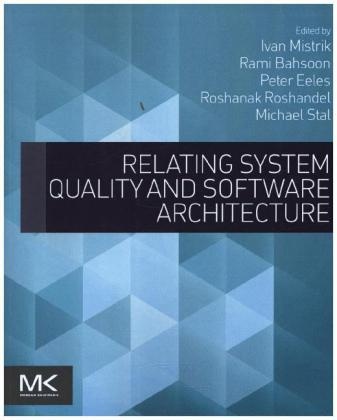Read more
Informationen zum Autor Ivan Mistrik is a computer scientist who is interested in system and software engineering (SE/SWE) and in system and software architecture (SA/SWA), in particular: life cycle system/software engineering, requirements engineering, relating software requirements and architectures, knowledge management in software development, rationale-based software development, aligning enterprise/system/software architectures, and collaborative system/software engineering. He has more than forty years’ experience in the field of computer systems engineering as an information systems developer, R&D leader, SE/SA research analyst, educator in computer sciences, and ICT management consultant. In the past 40 years, he has been primarily working at various R&D institutions and has done consulting on a variety of large international projects sponsored by ESA, EU, NASA, NATO, and UN. He has also taught university-level computer sciences courses in software engineering, software architecture, distributed information systems, and human-computer interaction. He is the author or co-author of more than 80 articles and papers in international journals, conferences, books and workshops, most recently a chapter Capture of Software Requirements and Rationale through Collaborative Software Development, a paper Knowledge Management in the Global Software Engineering Environment, and a paper Architectural Knowledge Management in Global Software Development. He has written a number of editorials and prefaces, most recently for the book on Aligning Enterprise, System, and Software Architecture and the book on Agile Software Architecture. He has also written over 120 technical reports and presented over 70 scientific/technical talks. He has served in many program committees and panels of reputable international conferences and organized a number of scientific workshops, most recently two workshops on Knowledge Engineering in Global Software and Development at International Conference on Global Software Engineering 2009 and 2010 and IEEE International Workshop on the Future of Software Engineering for/in the Cloud (FoSEC) held in conjunction with IEEE Cloud 2011.He has been the guest-editor of IEE Proceedings Software: A special Issue on Relating Software Requirements and Architectures published by IEE in 2005 and the lead-editor of the book Rationale Management in Software Engineering published by Springer in 2006. He has been the co-author of the book Rationale-Based Software Engineering published by Springer in May 2008. He has been the lead-editor of the book Collaborative Software Engineering published by Springer in 2010, the book on Relating Software Requirements and Architectures published by Springer in 2011 and the lead-editor of the book on Aligning Enterprise, System, and Software Architectures published by IGI Global in 2012. He was the lead-editor of the Expert Systems Special Issue on Knowledge Engineering in Global Software Development and the co-editor of the JSS Special Issue on the Future of Software Engineering for/in the Cloud, both published in 2013. He was the co-editor for the book on Agile Software Architecture published in 2013. Currently, he is the lead-editor for the book on Economics-driven Software Architecture to be published in 2014. Rami Bahsoon is a Senior lecturer in Software Engineering and founder of the Software Engineering for/in the Cloud interest groups at the School of Computer Science, University of Birmingham, UK. His group currently comprises nine PhD students working in areas related to cloud software engineering and architectures. The group’s research aims at developing architecture and frameworks to support and reason about the development and evolution of dependable ultra-large complex and data-intensive software systems, where the investigations span cloud computing architectures and their economics. Bahsoon had founded and co-organized the International ...
List of contents
Preface
Chapter 1: Introduction to Relating System Quality and Software Architecture
Part I: Human-Centric Evaluation for Systems Qualities and Software Architecture
Chapter 2: Exploring How the Attribute Driven Design Method is Perceived
Chapter 3: Harmonizing the Quality View of Stakeholders
Chapter 4: Optimizing Functional and Quality Requirements according to Stakeholder's Goals
Part II: Analysis, Monitoring and Control of Software Architecture for System Qualities
Chapter 5: Hasard: A Model-Based Method for Quality Analysis of Software Architecture
Chapter 6: Lightweight Evaluation of Software Architecture Decisions
Chapter 7: A Rule-Based Approach to Architecture Conformance: Checking as a Quality Management Measure
Chapter 8: Dashboards for Continuous Monitoring of Product Development Quality Progress
Part III: Domain-Specific Software Architecture and Software Qualities
Chapter 9: Achieving Quality in Customer-Configurable Products
Chapter 10: Archample: Architectural Analysis Approach for Multiple Product Line Engineering
Chapter 11: Quality Attributes when Architecting Medical Planning and Simulation Systems
Chapter 12: Addressing Usability Requirements in Mobile Software Development
Chapter 13: Understanding Quality Requirements Engineering in Contract-based Projects from the Perspective of Software Architects: an Exploratory Study
Report
"This book provides insights on exploring, navigating, pursuing, and learning from bad and good architectures, while looking for best practices for researchers and practitioners.Quality, one of the very important success factors of any software engineering project, is well articulated." --Computing Reviews

